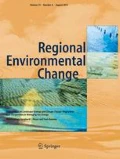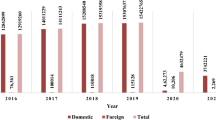Abstract
This paper investigates learning occurring through cross-cultural collaboration and how learning processes and outcomes of such learning affect the governance of regional lands and resources in the context of a First Nation-industry partnership in northwestern Ontario, Canada. We use transformative learning theory as a basis for critically analyzing individual, social, and structural changes. Transformative theory has been found to be suitable for working with natural resource problems and has evolved over time to include ways for accounting for different cultural frames of reference. We attempted a decolonizing approach in our research methodology hoping to understand learning events and outcomes as expressed by the research participants according to their own worldviews. Thirty-six participants involved in the First Nation-industry partnership were engaged in semi-structured interviews. Our results reveal different events that catalyzed both transformative and culturally framed learning outcomes for participants, such as much deeper appreciation for cultural practices and shared understanding of provincial forest policies. Four types of events were identified as catalysts for such learning outcomes: (i) time spent on the land; (ii) social meetings; (iii) ceremony, and (iv) formal meetings. Each type of learning event corresponded with different learning outcomes that arose from being involved in the partnership. Drawing from the literature on transformative and Indigenous learning, our study resulted in a synthetic “two-row” frame for cross-cultural learning and demonstrates that this learning was important for building cross-cultural collaborations for resource use.


Similar content being viewed by others
References
Agrawal A (1995) Dismantling the divide between Indigenous and scientific knowledge. Dev Chang 26(3):413–439. https://doi.org/10.1111/j.1467-7660.1995.tb00560.x
Bartlett JG, Iwasaki Y, Gottlieb B, Hall D, Mannell R (2007) Framework for Aboriginal-guided decolonizing research involving Metis and First Nation persons with diabetes. Soc Sci Med 65(11):2371–2382. https://doi.org/10.1016/j.socscimed.2007.06.011
Bartlett C, Marshall M, Marshall A (2012) Two-eyed seeing and other lessons learned within a co-learning journey of bringing together indigenous and mainstream knowledges and ways of knowing. J Environ Stud Sci 2(4):331–340. https://doi.org/10.1007/s13412-012-0086-8
Cranton P (2006) Understanding and promoting transformative learning,2nd ed. Jossey-Bass, San Francisco
Davidson-Hunt I, Berkes F (2010) Journeying and remembering: Anishinaabe landscape ethnoecology from Northwest Ontario. In: Johnson LM, Hunn ES (eds) Landscape ethnoecology: concepts of biotic and physical space. Berghahn, New York, pp 222–240
Diduck A, Sinclair AJ, Hostetler G, Fitzpatrick P (2012) Transformative learning theory, public involvement, and natural resource and environmental management. J Environ Plan Manag 55(10):1311–1330. https://doi.org/10.1080/09640568.2011.645718
Dunn K (2005) Interviewing. In: Hay I (ed) Qualitative research methods in human geography, 2nd edn. Oxford University Press, Melbourne, pp 79–105
Fisher-Yoshida B, Geller KD, Schapiro SA (2009) Innovations in transformative learning: space, culture and the arts. Peter Lang Publishing, New York
Folke C, Olsson HT, Norberg J (2005) Adaptive governance of social-ecological systems. Annu Rev Environ Resour 30:441–473. https://doi.org/10.1146/annurev.energy.30.050504.144511
Gerlak AK, Heikkila T, Smolinski SL, Huitema D, Armitage D (2018) Learning our way out of environmental policy problems: a review of scholarship. Policy Sci:1–37. https://doi.org/10.1007/s11077-017-9278-0
Gozawa J (2009) The cultural complex and transformative learning environments. J Transform Educ 7(2):114–133. https://doi.org/10.1177/1541344610362095
Grand Council Treaty #3 (n.d.) The Anishinaabe Nation of Treaty #3 Manito Aki Inakonigaawin Unofficial Consolidation. http://www.gct3.ca/wp-content/uploads/2016/02/mai_unofficial_consolidated_copy1.pdf. Accessed 1 Sept 2017
Habermas J (1981) The theory of communicative action, volume 1. Reasons and the rationalization of society. Beacon Press, Boston
Hatcher A, Bartlett C, Marshall A, Marshall M (2009) Two-eyed seeing in the classroom environment: concepts, approaches and challenges. Can J Sci Math Technol Educ 9(3):141–153. https://doi.org/10.1080/14926150903118342
Hessing M, Summerville T (2014) Canadian natural resource and environmental policy: political economy and public policy. UBC Press, Vancouver
Howitt R, Doohan K, Suchet-Pearson S, Cross S, Lawrence R, Lunkapis GJ, Muller S, Prout S, Veland S (2013) Intercultural capacity deficits: contested geographies of coexistence in natural resource management. Asia Pac Viewp 54(2):126–140. https://doi.org/10.1111/apv.12014
Hulsether M (2004) New approaches to the study of religion and culture. In: Antes P, Geertz AW, Warne RR (eds) New approaches to the study of religion. Volume 1: regional, critical, and historical approaches. Walter de Gruyter GmbH & Co, Berlin
Ioris AAR, Benites T, Goettert JD (2019) Challenges and contributions of indigenous geography: learning with and for the Kaiowa-Guarani of South America. Geoforum 102:137–141. https://doi.org/10.1016/j.geoforum.2019.03.023
Jaisura BP (2010) Miitigoog shareholders agreement. Weiler Barister & Solicitors, Guelph
Kooiman J (2003) Governing as governance. SAGE Publications Inc., London
Maclean K, The Bana Yarralji Bubu Inc (2015) Crossing cultural boundaries: integrating Indigenous water knowledge into water governance through co-research in the Queensland Wet Tropics, Australia. Geoforum 59:142–152. https://doi.org/10.1016/j.geoforum.2014.12.008
McGregor L (2018) Conducting community-based research with First Nation communities. In: McGregor D, Restoule JP, Johnston R (eds) Indigenous research: theories, practices and relationships. Canadian Scholars Press, Toronto
McKeon M (2012) Two-eyed seeing into environmental education: Revealing its “natural” readiness to indigenize. Canadian Journal of Environmental Education (CJEE) 17:131–147. https://cjee.lakeheadu.ca/article/view/1071
McNamara RA, Naepi S (2018) Decolonizing community psychology by supporting Indigenous knowledge, projects, and students: lessons from Aotearoa New Zealand and Canada. Am J Community Psychol 62:340–349. https://doi.org/10.1002/ajcp.12296
Merriam SB (2004) The role of cognitive development in Mezirow’s transformational learning theory. Adult Educ Q 55(1):60–68. https://doi.org/10.1177/0741713604268891
Mezirow J (1991) Fostering critical reflection in adulthood: a guide to transformative and emancipatory learning. Jossey-Bass, San Francisco
Mezirow J (1997) Transformative learning: theory to practice. New Directions for Adult and Continuing Education 74:5–12. https://doi.org/10.1002/ace.7401
Mezirow J (2000) Learning to think like an adult: core concepts of transformative theory. In: Mezirow J(ed)Learning as transformation: critical perspectives of a theory in progress. Jossey-Bass, San Francisco, pp 3–33
Mezirow J (2003) Transformative learning as discourse. J Transform Educ 1(1):58–63. https://doi.org/10.1177/1541344603252172
Mezirow J (2012) Learning to think like an adult: core concepts of transformation theory. In: Taylor EW, Cranton P (eds) The handbook of transformative learning: theory, research, and practice. Jossey-Bass, San Francisco, pp 73–95
Moyer JM, Sinclair AJ (2020) Learning for sustainability: considering pathways to transformation. Adult Educ Q. https://doi.org/10.1177/0741713620912219
Muller K (2007) The two “mystery” belts of Grand River. The American Indian Quarterly 31(1):129–164. https://www.jstor.org/stable/4138898?casa_token=3j7LmZdFJvcAAAAA%3A94EpRDGewqnwppBqRlzz04sDpCmYTYDMXnz2q457HLfM36UqGO909gGu4WKzBiipsMy02Nk18O1YokDca-EOcy8iQXeJHjjXNZvN-gIYdoRCvOeh3zigfg&seq=1#metadata_info_tab_contents
Pahl-Wostl C (2009) A conceptual framework for analysing adaptive capacity and multi-level learning processes in resource governance regimes. Glob Environ Chang 19(3):354–365. https://doi.org/10.1016/j.gloenvcha.2009.06.001
Rangan H, Lane MB (2001) Indigenous people and forest management: comparative analysis of institutional approaches in Australia and India. Soc Nat Resour 14(2):145–160. https://doi.org/10.1080/089419201300000544
Ross H, Innes J (2005) A framework for designing co-operative management for the Great Barrier Reef World Heritage Area. In: Merino L, Robson J (eds) Managing the commons: conservation of biodiversity. CSMSS, The Christensen Fund, Ford Foundation, Semarnat, INE, pp 46–53
Sims L, Sinclair AJ (2008) Learning through participatory resource management programs: case studies from Costa Rica. Adult Educ Q 58(2):151–168. https://doi.org/10.1177/0741713607309802
Sinclair AJ, Collins S, Spalling H (2011) The role of participant learning in community conservation in the Arabuko-Sokoke Forest, Kenya. Conserv Soc 9(1):42–53. https://doi.org/10.4103/0972-4923.79187
Sinclair AJ, Kumnerdpet W, Moyer JM (2013) Learning sustainable water practices through participatory irrigation management in Thailand. Nat Res Forum 37(1):55–66. https://doi.org/10.1111/1477-8947.12012
Sipos Y, Battisti B, Grimm K (2008) Achieving transformative sustainability learning: engaging head, hands and heart. Int J Sustain High Educ 9(1):68–86. https://doi.org/10.1108/14676370810842193
Sium A, Desai C, Ritskes E (2012) Towards the ‘tangible unknown’: decolonization and the Indigenous future. Decolonization 1(1): i-xiii
Suškevičs M, Hahn T, Rodela R (2019) Process and contextual factors supporting action-oriented learning: a thematic synthesis of empirical literature in natural resource management. Soc Nat Resour 32(7):731–750. https://doi.org/10.1080/08941920.2019.1569287
Taylor E (2000) Analyzing research on transformative learning theory. In: Mezirow J (ed) Learning as transformation. Jossey-Bass, San Francisco, pp 285–328
Tisdell EJ (2003) Exploring spirituality and culture in adult and higher education, 1st edn. Jossey-Bass, San Francisco
Tisdell EJ, Thompson PM (2007) “Seeing from a different angle”: the role of pop culture in teaching for diversity and critical media literacy in adult education. Int J Lifelong Educ 26(6):651–673. https://doi.org/10.1080/02601370701711349
Williams R (1961) The long revolution, 1st edn. Broadview Press, Petterborough
Zurba M (2019) Framing the governance lifecycle of First Nations–industry forestry collaboration in northwestern Ontario, Canada. Can J For Res 49:395–403. https://doi.org/10.1139/cjfr-2018-0233
Zurba M, Diduck AP, Sinclair AJ (2016) First Nations and industry collaboration for forest governance in northwestern Ontario, Canada. Forest Policy & Economics 69:1–10. https://doi.org/10.1016/j.forpol.2016.04.003
Acknowledgements
We would like to express our deepest gratitude to the study participants. We would like to give special thanks to DanielWemigwans who was extremely helpful in introducing us to those involved in the Miitigoog partnership and the Grand Council of Treaty #3. We would also like to thank the reviewers for their constructive feedback on our manuscript. The research was supported by a SSHRC Doctoral Fellowship and was supported by a Social Science and Humanities Research Council of Canada (SSHRC 833-2008-1007) Community-University Research Alliance grant to establish the Common Ground Research Forum.
Author information
Authors and Affiliations
Corresponding author
Additional information
Communicated by Shannon Hagerman
Publisher’s note
Springer Nature remains neutral with regard to jurisdictional claims in published maps and institutional affiliations.
Rights and permissions
About this article
Cite this article
Zurba, M., Sinclair, A.J. & Diduck, A.P. “Two-Row” cross-cultural learning for collaborative governance of forestland in northwestern Ontario, Canada. Reg Environ Change 21, 57 (2021). https://doi.org/10.1007/s10113-021-01784-0
Received:
Accepted:
Published:
DOI: https://doi.org/10.1007/s10113-021-01784-0




